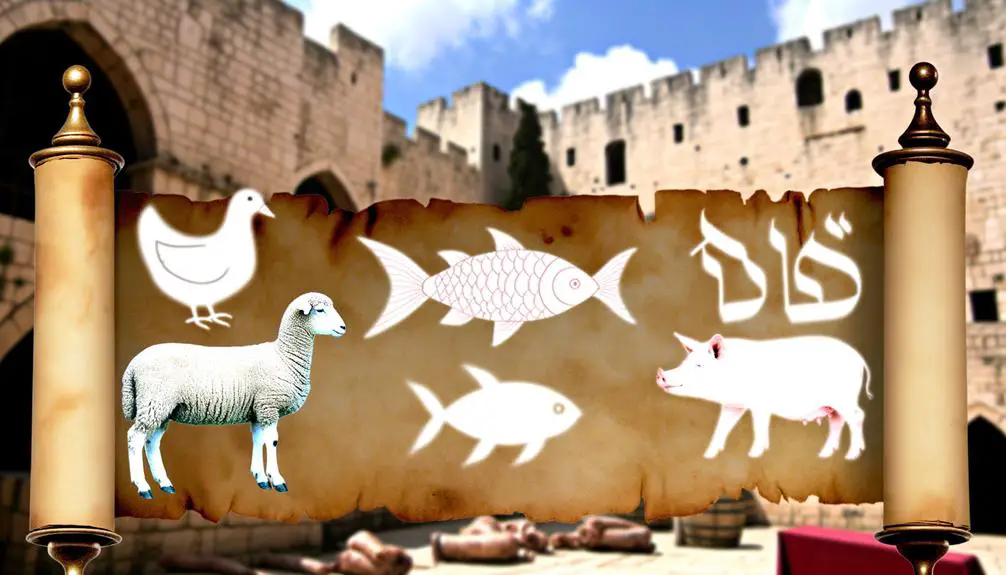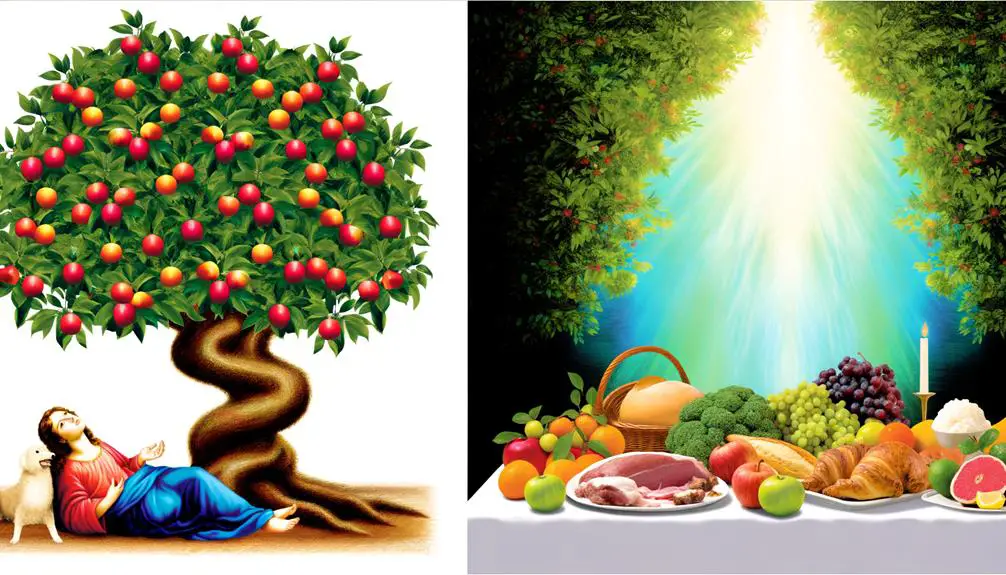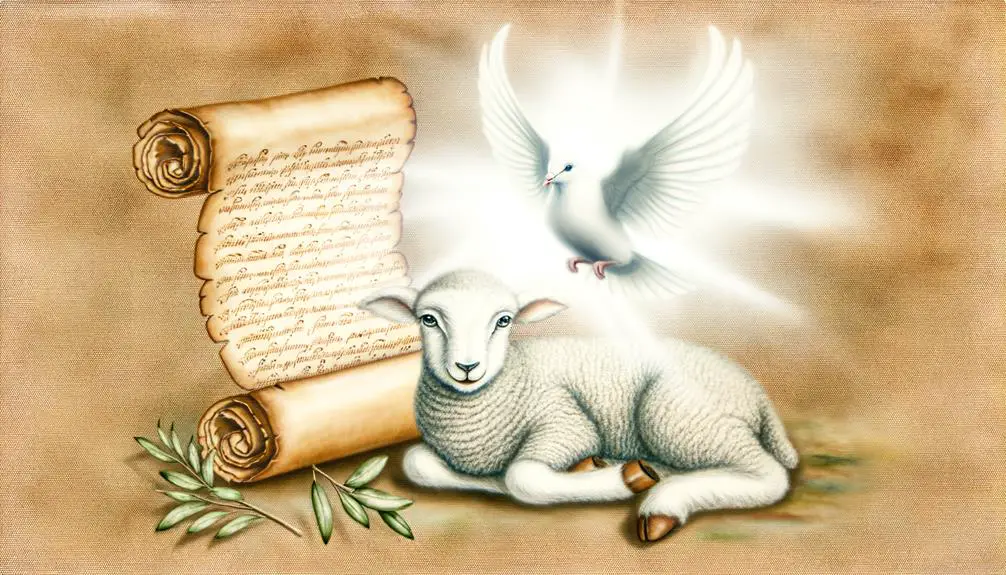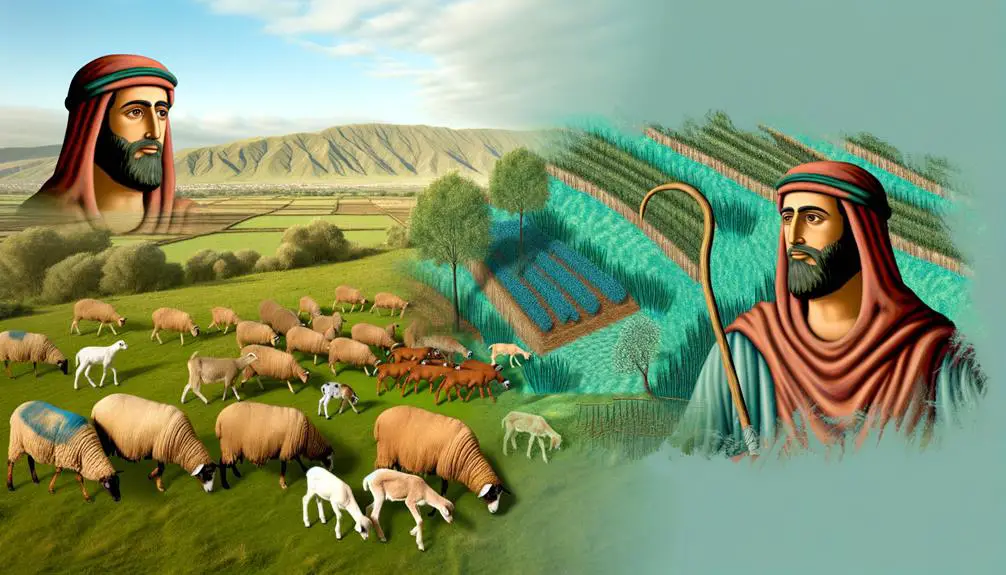Grasp the profound symbolism of meat in the Bible, delving into its impact on faith, food, and fellowship.

Meat in the Bible Means
As you sit at a feast, the variety of meats on the table isn't just about sating hunger; it's a tapestry of traditions and beliefs. In the Bible, meat weaves through narratives as symbols of sacrifice, purity, and communion, touching on dietary laws and ethical considerations.
It's a thread that ties together stories of provision, prohibitions, and prophecies, revealing layers of meaning that go beyond mere sustenance. As you explore these themes, you'll uncover how ancient texts continue to shape modern understandings of faith, food, and fellowship.
Let's embark on this journey to unravel the rich symbolism of meat in the Bible and its implications for today's world.
Key Takeaways
- Meat symbolizes spiritual purity, communal unity, and covenantal relationships with God.
- Biblical laws on meat consumption highlight health, ethical treatment of animals, and spiritual cleanliness.
- Communion and fellowship meals using meat solidify community bonds and spiritual unity.
- Meat in prophecies represents abundance, divine provision, and reflects on health, spirituality, and community living.
Symbolism of Sacrifice

Why does the act of sacrifice hold such profound symbolic significance in biblical narratives? At its core, the ritual of sacrifice, particularly the offering of animals, serves as a multifaceted symbol within the tapestry of biblical stories. You delve into these narratives, and you'll find that animal metaphors play a pivotal role in illustrating themes of atonement, covenant, and divine-human relationships. The act of sacrificing an animal, often a lamb or a dove, isn't merely a ritual act; it's a deeply symbolic gesture that reflects the themes of purity, submission, and redemption.
Through the lens of ritual purifications, the act of sacrifice takes on additional layers of meaning. These rituals, designed to cleanse and prepare individuals for worship or service, often required the spilling of blood or the offering of meat. This isn't just about adhering to a set of religious rules; it's a physical manifestation of a spiritual cleanse, a way to bridge the gap between the divine and the human. The consumption or offering of these animals symbolizes the transference of sin and impurity from the individual to the sacrifice, thereby purifying the worshipper.
Animal metaphors within these sacrifices further enrich the symbolism. For instance, the lamb often represents innocence and purity, making its sacrifice a powerful symbol of surrender and atonement. Through this act, the biblical narrative emphasizes themes of reconciliation and the restoration of divine favor.
Dietary Laws and Restrictions

In the complex tapestry of biblical narratives, dietary laws and restrictions serve as critical elements that delineate not only religious observance but also cultural identity and ethical considerations. These guidelines, deeply rooted in ancient texts, reflect a profound understanding of health, spirituality, and community.
As you delve deeper, you'll discover that these laws aren't arbitrary but are influenced by both health benefits and cultural influences. Here's a closer look:
- Preservation of Health: Many of the dietary laws outlined in the Bible, such as prohibitions against consuming certain types of meat, can be linked to health benefits. For instance, avoiding pork, which in ancient times was more likely to carry parasites, helped protect communities from foodborne illnesses.
- Cultural Influences: The dietary restrictions also served to set apart the followers of the biblical faith from neighboring cultures with different eating practices. This distinction in diet reinforced a sense of identity and unity among the community.
- Ethical Eating Practices: Some laws hint at ethical considerations, such as the humane treatment of animals. The requirement for slaughtering animals in a specific manner may reflect an early form of ethical consciousness regarding animal welfare.
- Adaptations Over Time: The interpretation and application of these dietary laws have evolved, influenced by changing cultural contexts and increased understanding of nutrition and health science. This adaptability showcases the dynamic nature of religious texts and their relevance to contemporary life.
Expressions of Purity

You'll find that expressions of purity in the biblical context are deeply intertwined with the interpretation of dietary laws and the significance of sacrificial rituals. These frameworks not only dictate the consumption behaviors but also symbolize broader spiritual and communal purity.
Dietary Laws Interpretation
Understanding the dietary laws in the Bible requires examining their role as expressions of purity within ancient societies. These laws weren't just arbitrary; they had deep health implications and were significantly shaped by cultural influences. Here's how they served as expressions of purity:
- Health implications: Certain prohibitions likely served to protect communities from diseases associated with specific foods.
- Cultural influences: Dietary laws helped define and maintain the distinct identity of ancient Hebrews.
- Spiritual purity: Observing these laws was seen as a form of spiritual discipline, enhancing one's purity before God.
- Social cohesion: Shared dietary practices reinforced community bonds and set boundaries between different groups.
Analyzing these aspects reveals the multifaceted significance of dietary laws beyond mere food consumption.
Sacrificial Rituals Significance
Just as dietary laws served to express purity and community cohesion, sacrificial rituals also played a vital role in spiritual cleanliness and societal structure within ancient biblical contexts. These ceremonies, steeped in tradition, utilized specific ritual objects and priestly garments, each symbolizing various aspects of purification and dedication to divine service.
The meticulous choice of ritual objects — from the altars to the sacrificial knives — underscored the solemnity and sacredness of the acts being performed. Moreover, the priestly garments weren't merely attire but represented a tangible expression of holiness, setting the priests apart as mediators between the divine and the mortal realms.
Together, these elements framed a complex system where every detail contributed to the overarching themes of purification, dedication, and community unity.
Communion and Fellowship

You'll find that symbolic meal sharing within the Biblical context serves not only as a ritualistic act but also as a profound means of building community bonds.
This practice underlines the importance of communion in fostering a sense of unity and shared identity among participants.
Through such gatherings, individuals are woven into the larger fabric of their community, highlighting the multifaceted role of meat in these sacred occasions.
Symbolic Meal Sharing
Symbolic meal sharing, such as Communion and fellowship, serves as a crucial element in Christian tradition, embodying spiritual unity and collective remembrance. This practice isn't just a ritual; it's deeply rooted in hospitality customs and cultural variations, highlighting the diversity within the Christian faith.
Hospitality Customs: The act of sharing meals is a universal sign of welcome and friendship across cultures, enhancing the spiritual bond.
Cultural Variations: Different Christian communities interpret and practice Communion and fellowship meals in unique ways, reflecting local traditions and beliefs.
Spiritual Unity: These meals symbolize the believers' unity with Christ and with each other, transcending individual differences.
Collective Remembrance: They serve as a physical reminder of Christ's sacrifices and teachings, fostering a shared spiritual heritage.
Building Community Bonds
Communion and fellowship meals play a pivotal role in knitting together the fabric of Christian communities, fostering a sense of belonging and mutual support among believers. These gatherings aren't merely social events but are imbued with profound economic implications and cultural differences that underscore their significance.
Economically, they serve as a mechanism for distributing resources within the community, ensuring that all members, regardless of their financial status, partake in the communal bounty. Culturally, these meals provide a platform for the expression and preservation of diverse traditions and practices, acting as a bridge that connects members from varied backgrounds.
Through this lens, it's evident that communion and fellowship meals are instrumental in building and sustaining the communal bonds that define Christian fellowship, transcending mere physical sustenance to nourish the collective spirit of the community.
Prohibitions and Permissions

Within the biblical context, various texts explicitly outline which meats are permissible for consumption and which are strictly forbidden. This delineation not only reflects spiritual and moral considerations but also hints at ancient wisdom regarding health benefits and cooking methods.
Here are four critical aspects to consider:
- Health Benefits: The Bible's dietary laws, such as those found in Leviticus, implicitly recognize the health risks associated with certain meats. Modern science has come to support some of these ancient prohibitions, linking them to dietary health benefits. For example, the restriction against consuming pork can be seen through a lens of avoiding trichinosis, a concern not trivial in ancient times. Similarly, the emphasis on certain cooking methods, like fully cooking meat, aligns with modern understandings of food safety.
- Divine Prohibitions: Specific animals are deemed unclean for consumption, including shellfish and pork. This classification often correlates with dietary habits that could pose health risks in ancient times, acting as a divine guideline for healthy living.
- Permissions with Guidelines: While some meats are permitted, they come with clear instructions on preparation and consumption. For instance, the blood must be drained from the meat, reflecting both a spiritual and a practical approach to food preparation.
- Symbolic Meanings: Certain dietary laws carry symbolic weight, reinforcing spiritual lessons through the act of eating or abstaining. This practice intertwines physical health with spiritual well-being, encouraging a holistic approach to life.
Understanding these prohibitions and permissions offers insight into the Bible's comprehensive approach to health, spirituality, and community living, emphasizing not just what's eaten but how it's prepared and consumed.
Meat in Prophecies

Moving from the concrete regulations about meat in biblical law, it's crucial to explore how meat figures into biblical prophecies, reflecting deeper spiritual truths and future events. The symbolic use of meat in these prophecies often points to future feasts or apocalyptic sustenance, emphasizing both judgment and redemption.
In the realm of eschatology, meat takes on a layered significance. For instance, the Book of Isaiah describes a lavish feast of rich food and well-aged wine, including "marrow and fat" (Isaiah 25:6), symbolizing the abundance of God's kingdom and the end-time gathering of nations. This imagery isn't just about physical nourishment but signifies spiritual fulfillment and eternal joy in God's presence.
The prophetic texts also juxtapose the abundance of meat in God's kingdom with its absence as a form of judgment. The scarcity of meat in these contexts symbolizes divine retribution and the severance of the covenantal relationship between God and His people.
To highlight this dual role of meat in biblical prophecies, consider the following table:
Aspect |
Positive Symbolism |
Negative Symbolism |
|---|---|---|
Future Feasts |
Celebration, abundance, joy in God's kingdom |
Absence signifies judgment, covenantal breach |
Apocalyptic Sustenance |
Divine provision, eternal sustenance |
Scarcity as a result of divine retribution |
Covenantal Significance |
Restoration, communion with God |
Severance, alienation from God |
Through this analytical lens, you can see how meat in biblical prophecies serves as a potent symbol of both God's provision and judgment, encapsulating the complex relationship between the divine and the human in the eschatological narrative.
Ethical Considerations

As we delve into the ethical considerations surrounding meat consumption as depicted in the Bible, it's essential to examine the nuanced moral frameworks that govern these practices. The biblical perspective on eating meat isn't just historical; it presents a complex interplay of divine command, human need, and ethical stewardship.
This conversation becomes even more critical when viewed through the lens of modern sensibilities concerning animal rights and modern farming practices. Here are four key points to consider:
- Stewardship vs. Dominion: The Bible advocates for stewardship over creation, which includes animals. This concept suggests a responsibility to care for and sustain the natural world, rather than exploit it. How does this reconcile with modern farming practices that often prioritize efficiency over animal welfare?
- Sacrificial Systems: In biblical times, the sacrificial system was a means to atone for sin and thank God, with meat consumption being a part of this practice. Does this historical context justify or complicate the ethical considerations of consuming meat today?
- Dietary Laws: The dietary restrictions present in the Bible weren't only for health but also for ethical and spiritual cleanliness. How do these laws inform our understanding of ethical eating and animal rights in a contemporary context?
- Compassion and Empathy: The Bible's teachings on compassion and empathy extend to all living creatures. In light of this, how should modern believers navigate the complexities of animal rights and the ethics of meat consumption?
Analyzing these points encourages a deeper understanding of the biblical stance on meat and its implications for ethical considerations in the context of modern farming and animal rights.
Frequently Asked Questions
How Did the Method of Meat Preparation Vary Across Different Biblical Cultures, and What Impact Did This Have on Social Interactions?
In ancient biblical cultures, cooking techniques for meat varied significantly due to dietary laws and available resources. These differences impacted social interactions, as dietary restrictions often determined communal dining and ceremonial practices.
For instance, methods like boiling, roasting, and smoking were common, but specific preparations could signify religious observance, fostering a sense of community among those sharing the same beliefs.
This variation in meat preparation also highlighted cultural identities and reinforced social hierarchies.
In Biblical Times, How Did the Economic Status of Individuals Influence Their Meat Consumption Habits?
In biblical times, your economic status greatly influenced your meat consumption habits. Those with wealth indulged in diverse meats, while the less affluent often adopted vegetarian practices due to cost.
Fishing techniques varied by region, providing a more accessible protein source for some. This disparity in diet mirrored social hierarchies, as meat consumption became a symbol of wealth and status, affecting social interactions and community dynamics.
Were There Any Specific Meats That Were Considered More Prestigious or Sought After, and What Was the Reasoning Behind This?
In ancient societies, certain meats were indeed seen as more prestigious due to animal symbolism and dietary laws. You'd find that animals like lambs or calves, often associated with religious sacrifices, held higher esteem.
This wasn't just about taste but deeply rooted in cultural and religious beliefs. The dietary laws further influenced this hierarchy, dictating what was clean or unclean to eat, which directly impacted the social status of these meats.
How Did Meat Consumption and Its Meanings Evolve From Old Testament Times to New Testament Times?
As you delve into the evolution of meat consumption from Old Testament to New Testament times, you'll discover a shifting landscape. Initially, animal sacrifices played a central role, deeply intertwined with religious practices. Dietary laws dictated consumption, marking a clear delineation of permissible eats.
Yet, as you journey to the New Testament, these strictures loosen, reflecting broader theological shifts. This transition wasn't merely dietary; it signified a profound transformation in spiritual practices and beliefs.
What Role Did Meat Play in Celebrations and Festivals Outside of the Contexts Mentioned, and How Did This Shift Over Time?
In exploring the role of meat in celebrations and festivals, you'll find that its significance shifted notably over time.
Initially, religious prohibitions and sacrificial significance heavily dictated meat consumption, aligning it with rituals and divine appeasement.
However, as societies evolved, meat's role in festivities became less about religious rites and more about communal bonding and celebration, showcasing a remarkable transition from strictly sacred to a broadly social and celebratory function.
Conclusion
In the tapestry of biblical texts, meat weaves a complex narrative. It's not merely sustenance, but a symbol drenched in divine significance. Like a multifaceted gem, each aspect—from sacrificial rituals to dietary mandates—reflects a facet of spiritual purity, communal bonding, and ethical introspection.
Through the lens of prophecy and permission, meat serves as a vessel, carrying the weight of moral dilemmas and divine decrees. Thus, in the biblical context, meat transcends its physical form, embodying a rich mosaic of spiritual and ethical conundrums.



Sign up